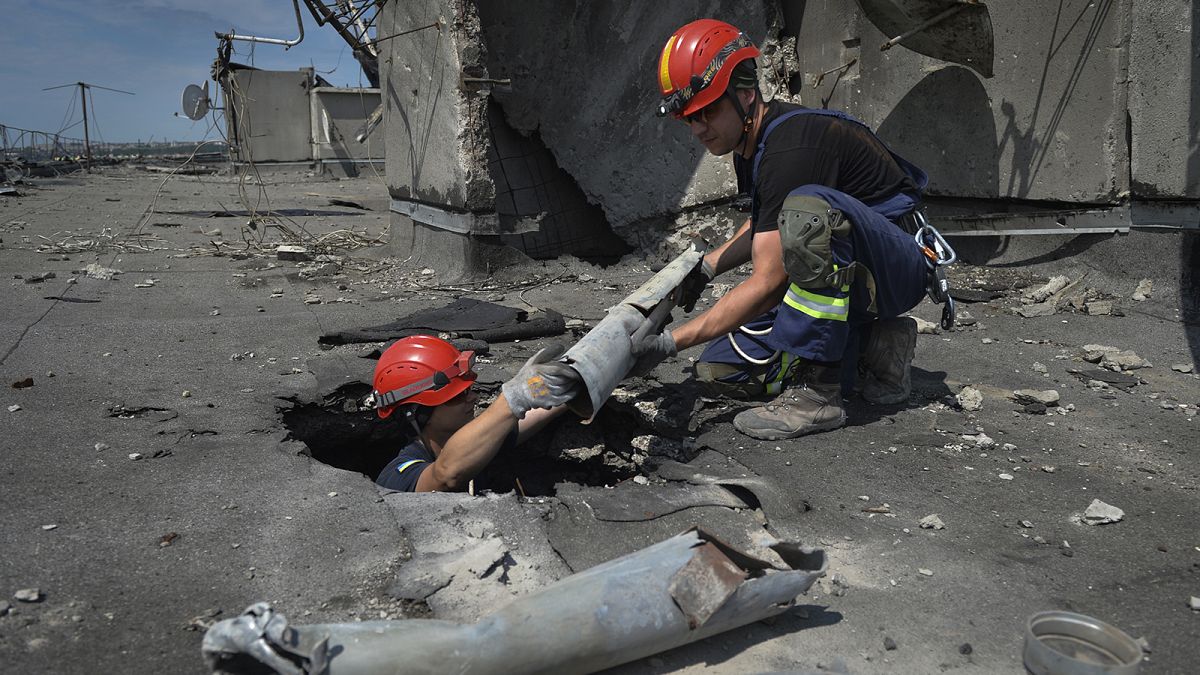From Norway donating almost €1 billion to Ukraine to Gazprom seizing an energy project co-owned by British and Japanese companies, here are five of the latest developments in the war.
1. Russia bombards residential buildings in Odesa region, killing at least 21
Ukrainian authorities say Russian missiles have struck a multi-storey block of flats and nearby holiday resorts in Ukraine's southern Odesa region, killing at least 21 people and wounding dozens.
The Ukrainian president's office said three X-22 missiles fired by Russian bombers struck an apartment building and two campsites. Ukraine’s Security Service said two children were among the dead.
Ukraine’s Security Service said 38 people, including six children and a pregnant woman, were being treated in hospital for injuries.
Kyiv says the missiles were fired from a plane in the Black Sea, where a day earlier Russian troops left the strategically important Snake Island.
“A terrorist country is killing our people. In response to defeats on the battlefield, they fight civilians," said Andriy Yermak, the chief of staff to the Ukrainian president.
2. Norway announces€970-millionUkraine donation
Norway said Friday it will donate €970 million to Ukraine, during a visit to the country by its Prime Minister.
Spread over two years, the significant donation of 10 billion Norwegian crowns must be used by Kyiv for humanitarian aid, reconstruction efforts, purchasing weapons and supporting the functioning of the Ukrainian authorities, according to the Norwegian government.
This money comes on top of previous aid and arms promised to Ukraine by the Nordic country.
"We stand with the people of Ukraine," Norweigan Prime Minister Jonas Gahr Støre said in the statement. "We are contributing to support the Ukrainians' fight for freedom. They are fighting for their country, but also for our democratic values".
Norway's government made the announcement following a trip by Støre on Friday to Kyiv, as well as to Yahidne, a Ukrainian village devastated by the war.
The Norweigan leader was left rattled by the visit, describing what he saw in the village as "a glimpse of hell on earth", according to the Norwegian news agency NTB.
3. Kyiv asks Turkey to seize ship believed to be carrying stolen grain
Ukraine has requested that Turkey detain and arrest the Russian-flagged cargo ship Zhibek Zholy carrying a cargo of Ukrainian grain taken from the Russian-occupied port of Berdyansk.
In a letter dated June 30 to Turkey's justice ministry, Ukraine's prosecutor general's office stated that the 7,146-tonne Zhibek Zholy was involved in the "illegal export of Ukrainian grain" from Berdyansk and headed to Karasu, Turkey, with 7,000 tonnes of cargo, which is a larger cargo than cited by the official.
The Ukrainian prosecutor general's office asked Turkey to "conduct an inspection of this sea vessel, seize samples of grain for forensic examination, demand information on the location of such grain", the letter said, adding that Ukraine was ready to conduct a joint investigation with Turkish authorities.
A Russian-installed official in Russian-occupied areas of Ukraine's Zaporizhzhia region said on Thursday that after a stoppage of several months the first cargo ship had left Berdyansk port without naming the Zhibek Zholy.
Ukraine has accused Russia of stealing grain from the territories that Russian forces have seized since its invasion began in late February. The Kremlin has previously denied that Russia has stolen any Ukrainian grain.
4. Russia seizes UK and Japanese-owned energy project
Russia took control of a large-scale gas and oil project in its far east on Thursday in a move that is likely to escalate tensions with the West.
President Vladimir Putin signed off a decree that seized full control of the Sakhalin-2 project, which is part-owned by Shell and Japanese investors.
The five-page decree, which was signed late Thursday, created a new firm to take over all the rights and obligations of Sakhalin Energy Investment Co, in which Britain's Shell and two Japanese trading companies Mitsui and Mitsubishi hold just under 50%.
The move follows Western sanctions imposed on Moscow over its invasion of Ukraine that have hit Russia's large energy industry.
Russia's state-run Gazprom, itself the target of sanctions from the US, the UK and Europe, already owns 50% of the Sakhalin-2 project, which produces 4% of the world's liquefied natural gas.
It is one of the world's largest LNG projects with an output of 12 million tonnes, with cargoes mainly heading to Japan, South Korea, China, India and other Asian countries.
5. Ukraine wins the 'borsch war' against Russia
Ukraine won a symbolic battle over Russia on Friday after UNESCO recognised that the Russian invasion was threatening the country's borsch culture, adding it to its list of intangible cultural heritage in danger.
Borsch is a sour soup made from beetroot, meat, cabbage and vegetables, variants of which are consumed across eastern Europe, including Ukraine and Russia.
"Victory in the borsch war is ours," said Ukrainian Culture Minister Oleksandr Tkatchenko, following the UNESCO announcement.
Ukraine "will win both the borscht war" and on the ground against Moscow, he wrote on his Telegram account.
In April, Ukraine asked UNESCO to put borsch on its list, claiming the Russian invasion was jeopardising the "viability" of the traditions surrounding the dish.
Two months later, a UNESCO committee agreed with Kyiv's request.
While the existence of the soup was "not in danger in itself", committee member Pier Luigi Petrillo said "the human and living heritage which is associated with borsch [...] is in immediate danger because the capacity of the populations to practice, to transmit their intangible cultural heritage is seriously disrupted because of the armed conflict."
